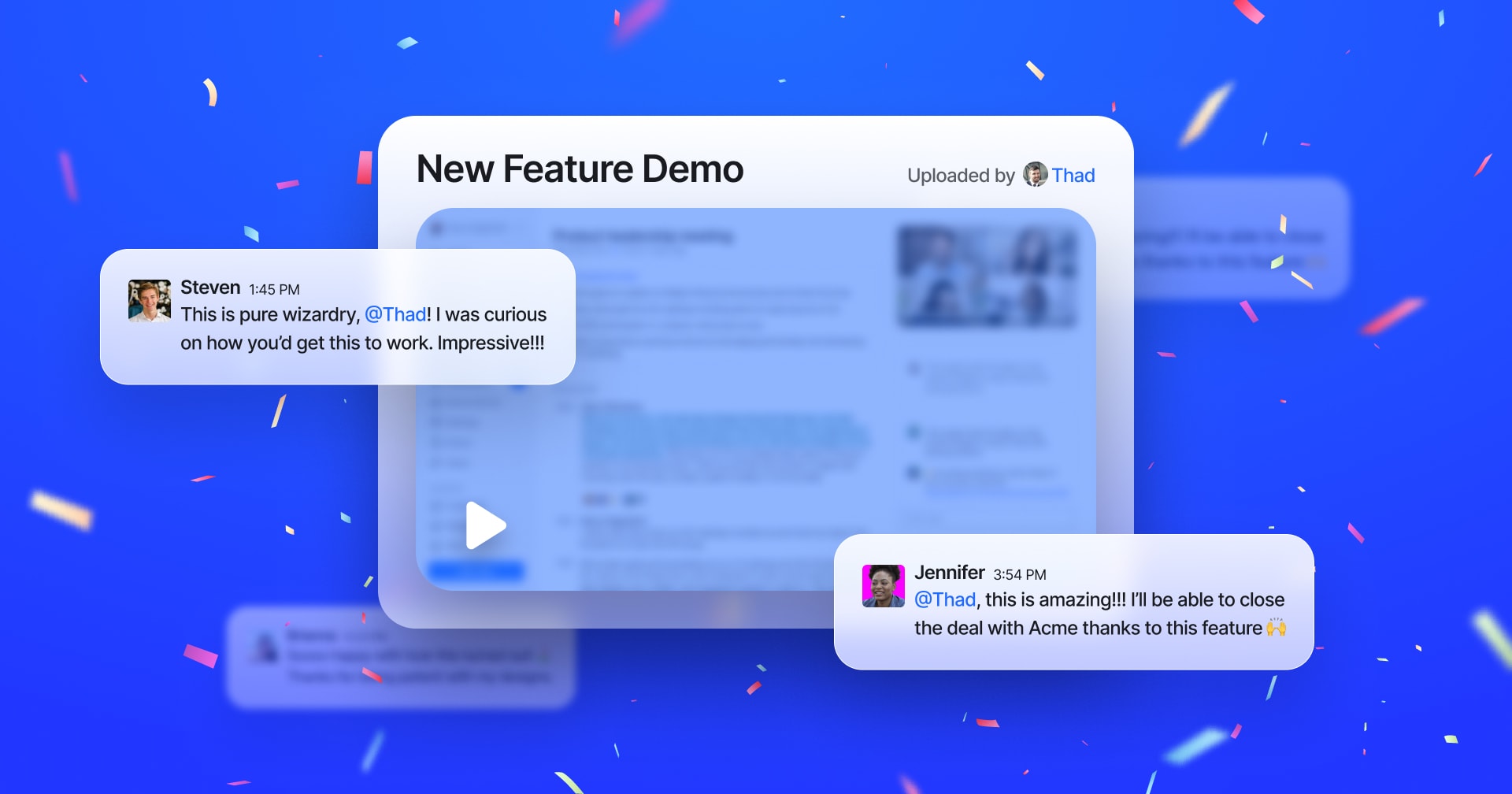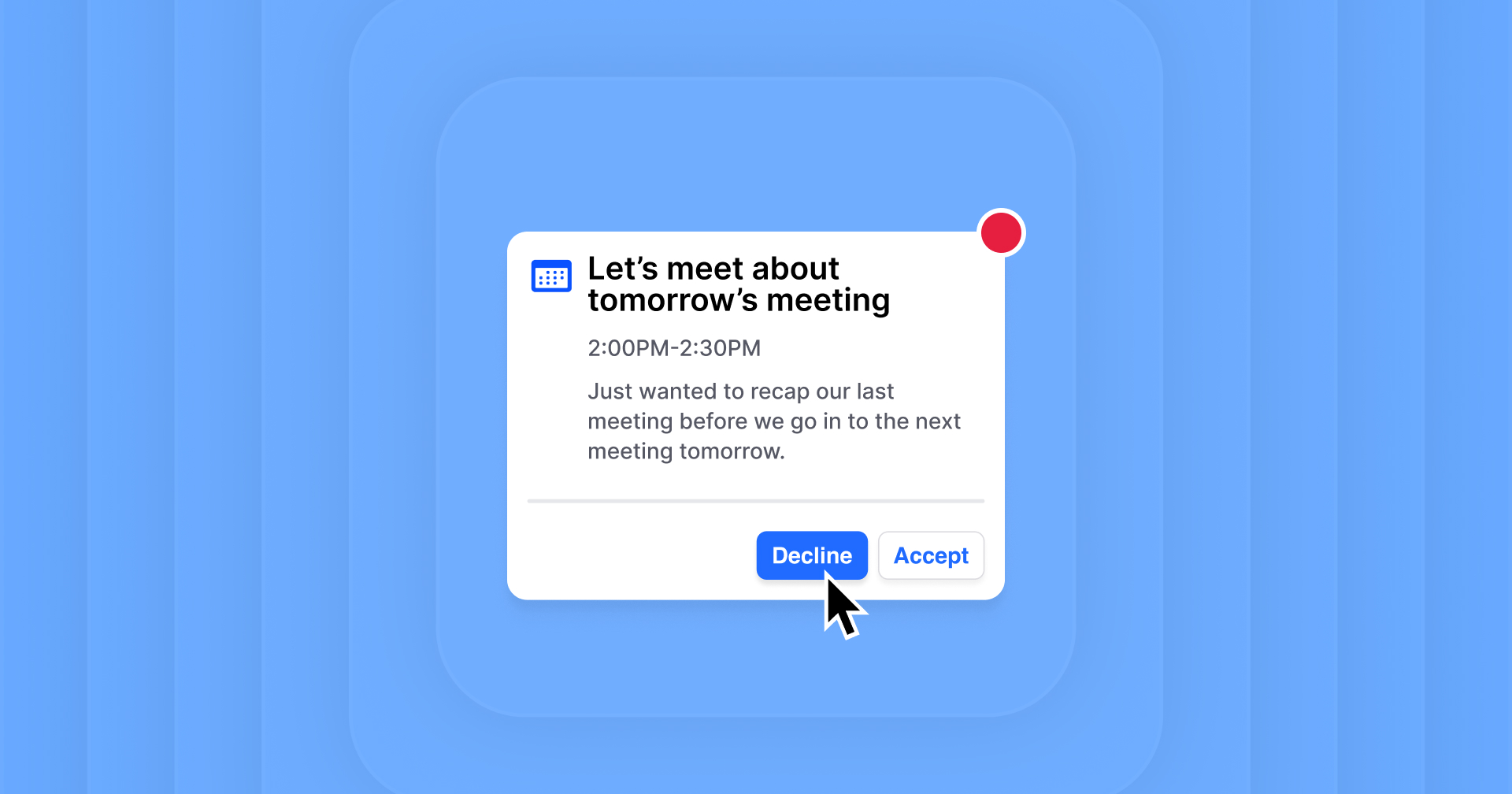How sharing cross-functional wins leads to company success
A Q+A with Rewatch’s CEO Connor Sears and Account Executive Max Frye
By Darcy Hogendorn in

Building a culture of celebrating wins is a powerful way for company leaders to send a message that individuals and teams are central to company success, and the benefits of this approach can’t be overstated.
At Rewatch, we spent a lot of time refining our mission, vision, and values, and as important as that exercise was, nothing was as impactful for team morale, alignment, and goal reinforcement as communicating wins across teams.
Rewatch’s founder and CEO, Connor Sears, and Account Executive Max Frye sat down to dig a little deeper into the importance of aligning the company towards common goals, automating sharing wins, and what an organic compliment can do for morale.
Why is it a challenge to reinforce common goals throughout an organization?
Connor Sears: I think one common problem that a lot of companies run into is that they create one goal that everybody's supposed to feel motivated by when in reality, every part of your company should be contributing to the goal differently. I think that's one challenge a lot of people have: They don't recognize that every team is incentivized differently, has a different point of view, and different techniques they're employing to hopefully contribute to this goal. The best company goals can't be achieved by one team.
Max Frye: You also need to feel like if you're given a goal or a target, that you can actually achieve it. That way, you feel empowered to do what you need to do to achieve the goal.
CS: Common goals are hard, common outcomes should be a lot easier to align the company around.
Why is it meaningful when congratulations come from a department that's not your own?
CS: I think it's meaningful because it feels organic and like you're getting true recognition from the company. When you get another department that's congratulating you, it feels like you're actually part of a team, right? It really highlights the impact you're having on the whole company, which is a much bigger warm feeling and makes you feel more connected to the overall common outcome that we're all heading towards.
I also think that it builds tighter bonds between organizations. When you're siloed into your department, and every department is sort of doing its own thing completely separate from one another and not talking to one another, not sharing insights, I think you run the risk of not working at your full potential as a company because you're not leveraging each other's knowledge and insight, as well as different perspectives on how to get there.
MF: If I'm thinking of times when I've gotten recognition from other departments, it feels more meaningful, and maybe that's because if you're getting recognition from your boss or people on your team, it happens more often. But when you're getting it almost unexpectedly from another department, you realize that there's actually cross-functional visibility, someone saw your contribution, and they found it meaningful. In that scenario I feel valued, and I feel seen and heard in a way that getting congrats from your own team just isn't going to give you most of the time.
CS: Yeah. It's like when your mom calls you handsome, it's like, “thanks, Mom.”
What kinds of tools better enable that kind of celebration to become a habit rather than a chore or an occasion?
CS: I think tactically automating a lot of this stuff helps so much. There are certain triggers in the business like the “it's time to celebrate, you closed a deal,” trigger that sends a notification to folks, makes sure that everybody's aware of the win, whether it's through an email notification or whatnot. That just naturally allows people the opportunity to give a thumbs up.
A lot of times, those naturally-occurring moments happen behind closed doors during meetings that other people aren't invited to — it's not practical to invite everybody at the company to every meeting. So, I think what Rewatch does really well is illuminate a lot of these conversations and opportunities for celebration and sort of broadcasting that automatically across the company.
MF: With Rewatch, it seems way more organic. If I'm a salesperson and I'm watching the weekly product demo in the series, and I think, that's really cool that you're building that, I can comment on it, “This looks really cool.” Maybe that's not me saying, “Hey, good work” or “Congrats,” but it serves the same function, where maybe the engineer is seeing a salesperson comment and feeling, hey, I've been seen, I'm valued. It just feels more organic, which I think also makes it feel more real.
Why is it important that teams are able to directly tie their efforts to revenue?
CS: Revenue is the outcome that ultimately all teams are looking for. It's a very simple one, and I think for businesses, in addition to it being the lifeblood of your company, it's also an abstraction of a lot of things: It’s a great lagging indicator of all these things going well, from Customer Success to product development.
MF: Yeah, if you look at the OKR framework, revenue is the objective, and the key results are maybe what is more aligned to the individuals and the departments. But they all funnel up to that common objective, which is, of course, we want to generate revenue as a company. That's a North Star for most companies.
CS: And I think by doing that, you can work backward and start to recognize the contribution that everybody made and let everybody have insight into how they're doing. I think tying impact to revenue just keeps everybody aligned. It's a very easy way of evaluating impact.
MF: Agreed, it's a proxy for success. Is the company successful, or is it not? And revenue is one of a few, but definitely the central component.
How can companies share wins across the organization better?
MF: One of the most common questions I ask when I'm interviewing someone, and this has always been true, is “What motivates you?” Number one with salespeople, a lot of times, is money. But the thing I hear second most is always, “I want to have an impact.” So, if you're able to have an impact, and one of the ways you know if you are is when people are reaching out and congratulations and good work, then you're going to feel better. That's a major motivator.
CS: I think having tools that aren't siloed to one team and therefore have no cross-functional aspect is definitely key. The real power of Rewatch is that when it's bringing all these teams together into one place, it also makes the insights better and newer. Product teams don't always get insight from customers, and it's really exciting when they do. I would imagine that Sales teams don't get a lot of raw early product roadmap thinking either.
MF: Actually, no. It's one of their biggest frustrations. It’s often, “I want to close this deal, and they're asking for this thing, and unless they get it, I'm not gonna be able to close this deal, and if I can't close this deal, I'm not gonna hit quota…” and they have no idea if Product is actually building the feature, or if they know or care — it affects their livelihood.
CS: When you don't have good, continuous, organic conversation, these things feel like rugs getting pulled out from under you at the last second. I think what that scenario leads to is a lot of talking past each other. And I think it all goes back to the idea that “if we can anchor everything on this common goal, what are we actually trying to do?” Companies could actually find a lot better collaboration and communication between cross-functional teams that are really incentivized differently.
And I think that's some of the biggest impacts that Rewatch can have — this idea of plugging everybody at your company into the central knowledge base that is growing in real-time every day.
Think your team could benefit from more seamless collaboration, knowledge sharing, and cross-functional celebrations? Book a demo today.
Insights for the modern workplace
Get fresh ideas and practical tips to help your team work better, together. Delivered straight to your inbox.

